 Russia vs. Ukraine
Russia vs. Ukraine

Reading articles by genius @valued-customer always creates new challenges and frustrations!
It is very difficult for me to understand 100% of his articles with my unfamiliar English skills!
Perhaps native English-speaking Nigerians understand English better than I do!😅

However, I've ignored dear senior @roleerob's kind advice and decided to write my clumsy English sentences because I'm a stupid person who always makes reckless challenges and mistakes!😆
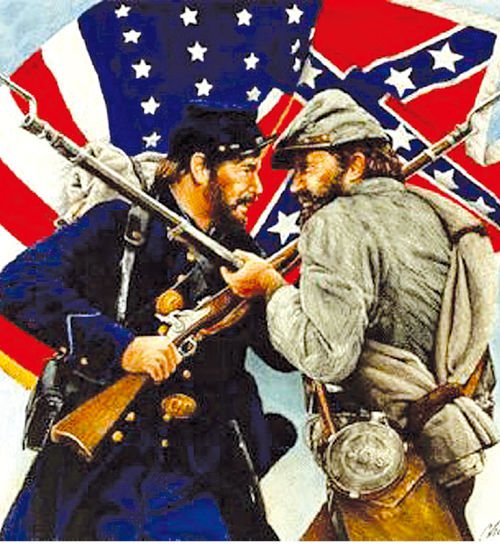
From my point of view, @roleerob was an ardent republican who had different views and beliefs than the liberal @valued-customer!
note that in modern history financial interests, banksters, today represented by the WEF, have always funded (lent money) to governments waging wars, because such wars are always existential threats to those waging them, and that causes them to discount expenses less than their lives, which the banksters translate into more profits for them. They always profit from both sides in such wars. No matter who wins the lenders that provided them the funds they used to win benefit from their victory.
Thus, geopolitical contests are largely irrelevant to banksters, because no matter which side conquers the other, the banksters always win. All wars are banksters' wars.
China has long been advanced as the boogeyman to the West, and the US as the boogyman to China and Russia. From the perspective of banksters, this is simply a marketing campaign for a business opportunity, since banksters win every war. The governments of the West are clearly in thrall to the WEF, most of the elected officials are literally minions of the WEF, trained to betray their populations in the Young Global Leaders program. The Chairman of the WEF, Schwab, has bragged about the penetration and infiltration of his traitorous agents into governments, and specifically mentioned Putin as one of them back in 2017.
Zelensky of the Ukraine is also a Young Global Leader, as is Xi Jinping, Biden, Trump, Castro, and the majority of heads of state. Therefore it is obvious that the war in the Ukraine is little more than a ploy of the WEF which is pitting Russia and the Ukraine against one another, both led by WEF minions, to reduce their populations to utter abject penury and helplessness, which leaves them without ability to provide their necessities and unable to refuse to submit to goods and services offered by WEF banksters regardless of the price: their sovereignty.
It is also obvious that the investors that own the corporations that provide essential goods and services across the entire world are profiting immensely from inflation created by central banks, owned by those same investors as own oil companies, shipping companies, and food producers. By pitting the East and West against each other in war, like fighting dogs in pits, the banksters increase the prices everyone pays for their products on both sides. Viewed from this perspective of the investors that own the corporations and countries of the world's governments, there is no geopolitical conflict at all. It's just two of their teams used to divide and conquer hapless subjects to a greater degree, subjecting their cattle to more profitable slavery.
This is why I advocate for everyone to adopt such decentralized means of production as are suitable for their personal circumstances, in order that they create themselves the goods and services they require to avail them of the blessings of civilization, and free them from dependence on centralized production facilities owned by banksters. Only being able to provide ourselves our needs enables us to retain our sovereignty, our freedom, and our prosperity. Independent means is the only meaningful definition of wealth, and the more money we possess, the more dependent we are on the creators of that money, the banksters. Financial wealth is not independence. It is chains that bind us to centralized overlords who create that money.
Money is not wealth at all. It is the very opposite.
The ability to create goods and services is wealth, and today the means of production are being utterly decentralized, such that individual households and small communities are able to produce their needs themselves, from food to electricity, from building materials to modern electronics. Solar panels and all manner of circuitry can be printed today using ordinary inkjet printers on easily made PET sheets, recycled from water bottles. Essential foodstuffs can be grown in backyard gardens, on sunny windowsills, and even in dark caves and garages under LED lights, using aquaponics technology that produces fish and seafood as well as garden vegetables. Actual real wealth and freedom has never been more possible than it is today, to all of us that make the effort to have it and eschew the parasitic financialization the WEF uses as bait to catch slaves.
Wherever one is today on Earth, whatever kind of government is imposed on the people of the place where we live, the rulers of that government are imposed by the WEF, and the WEF is imposing a global technocratic tyranny more totalitarian and oppressive than has ever been seen in history, because the technology of oppression has improved their ability to subjugate and enslave people. Whoever claims to rule you is your enemy, the agent of the WEF, and who you need to oppose to be free, prosperous, and happy. We need to follow no one, to elect no one, to submit to no overlord, to lead ourselves, to rule ourselves, and to create ourselves that prosperity and felicity we deliver a legacy to our sons and daughters after us that they might live happily.
That is the real war ongoing, between overlords, centralization, and utter slavery, and free people, decentralization, and prosperous liberty that enables people to themselves create their happiness.
I recommend the latter, and point out always that decentralization means doing yourself what needs doing, and that dependence on overlords for anything is snapping chains around your hands and feet. Grow food, produce power, create products, and that ability you wield when mirrored across your community at every scale, will create a paradise of prosperity.
I note that in modern history financial interests, banksters, today represented by the WEF,
I was shocked and surprised to hear @valued-customer's answer!
His argument was very different from that of the Japanese overlords!
The overlords of Japan have long been spreading their ideas and beliefs to the world I live in.
So, I learned international geopolitics from the overlords of Japan.
Why are Japan afraid of America?
Because the Japanese were always surrounded by the great Pacific Ocean, they were safe from invasions from China and Korea.
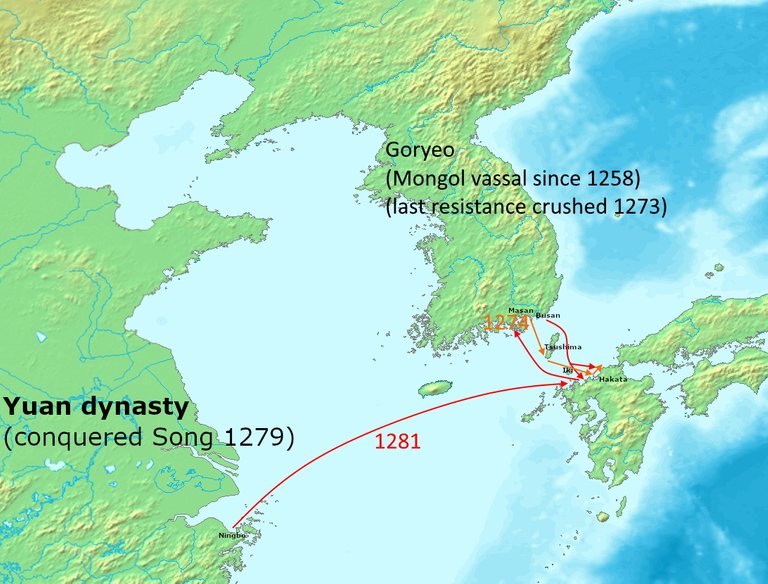 Mongol invasions of Japan in 1274 and 1281
Mongol invasions of Japan in 1274 and 1281
Major military efforts were taken by Kublai Khan of the Yuan dynasty in 1274 and 1281 to conquer the Japanese archipelago. Ultimately a failure, the invasion attempts are of macro-historical importance because they set a limit on Mongol expansion and rank as nation-defining events in the history of Japan. The invasions are referred to in many works of fiction and are the earliest events for which the word kamikaze ("divine wind") is widely used, originating in reference to the two typhoons faced by the Yuan fleets.
The invasions were one of the earliest cases of gunpowder warfare outside of China. One of the most notable technological innovations during the war was the use of explosive, hand-thrown bombs.[7]
In the 13th century, the Yuan Dynasty, which had the largest territory in the world, invaded Japan by forming an alliance with Goryeo.
Japan was at risk of being invaded by the Yuan dynasty and Goryeo, but was victorious with the help of a typhoon.
The Japanese thanked the wind god who sent the typhoon, and called the typhoon the god-sent wind kamikaze.
The Japanese made annual ancestral rites to kamikaze, calling Japan a sacred and great country protected by the gods.
I wonder if my esteemed American seniors will remember the word kamikaze!😉
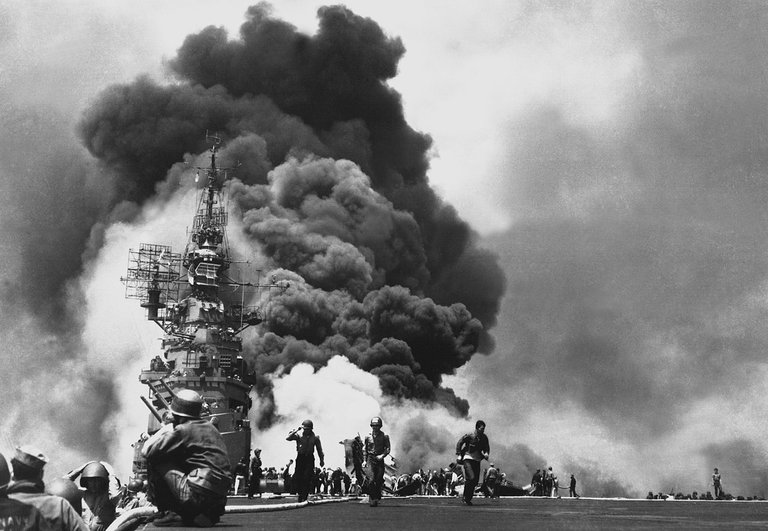 USS Bunker Hill, an aircraft carrier, was hit by two kamikazes on 11 May 1945, resulting in 389 personnel dead or missing and 264 wounded.[1]
USS Bunker Hill, an aircraft carrier, was hit by two kamikazes on 11 May 1945, resulting in 389 personnel dead or missing and 264 wounded.[1]
Kamikaze (神風, pronounced [kamiꜜkaze]; "divine wind" or "spirit wind"), officially Shinpū Tokubetsu Kōgekitai (神風特別攻撃隊, "Divine Wind Special Attack Unit"), were a part of the Japanese Special Attack Units of military aviators who flew suicide attacks for the Empire of Japan against Allied naval vessels in the closing stages of the Pacific campaign of World War II, intending to destroy warships more effectively than with conventional air attacks. About 3,800 kamikaze pilots died during the war, and more than 7,000 naval personnel were killed by kamikaze attacks.[2]
Kamikaze aircraft were essentially pilot-guided explosive missiles, purpose-built or converted from conventional aircraft. Pilots would attempt to crash their aircraft into enemy ships in what was called a "body attack" (tai-atari) in aircraft loaded with bombs, torpedoes and or other explosives. About 19% of kamikaze attacks were successful.[2] The Japanese considered the goal of damaging or sinking large numbers of Allied ships to be a just reason for suicide attacks; kamikaze was more accurate than conventional attacks and often caused more damage. Some kamikazes were still able to hit their targets even after their aircraft had been crippled.
The attacks began in October 1944, at a time when the war was looking increasingly bleak for the Japanese. They had lost several important battles, many of their best pilots had been killed, their aircraft were becoming outdated, and they had lost command of the air. Japan was losing pilots faster than it could train their replacements, and the nation's industrial capacity was diminishing relative to that of the Allies. These factors, along with Japan's unwillingness to surrender, led to the use of kamikaze tactics as Allied forces advanced towards the Japanese home islands.
The tradition of death instead of defeat, capture, and shame was deeply entrenched in Japanese military culture; one of the primary values in the samurai life and the Bushido code was loyalty and honor until death.[3][4][5][6] In addition to kamikazes, the Japanese military also used or made plans for non-aerial Japanese Special Attack Units, including those involving Kairyu (submarines), Kaiten human torpedoes, Shinyo speedboats and Fukuryu divers.
In modern usage, the word kamikaze is most commonly used to describe uncrewed and normally reusable hardware, especially unmanned aerial vehicles, when it is deliberately expended on suicide missions.[citation needed]
After defeating the invasions of the Mongols and Goryeos, the Japanese lived in the pride that Japan was a great and sacred world protected by the gods. However, with the rise of the Christian Empire in the New World from beyond the Pacific in 1853, the Japanese fell into a depth of fear and anger.
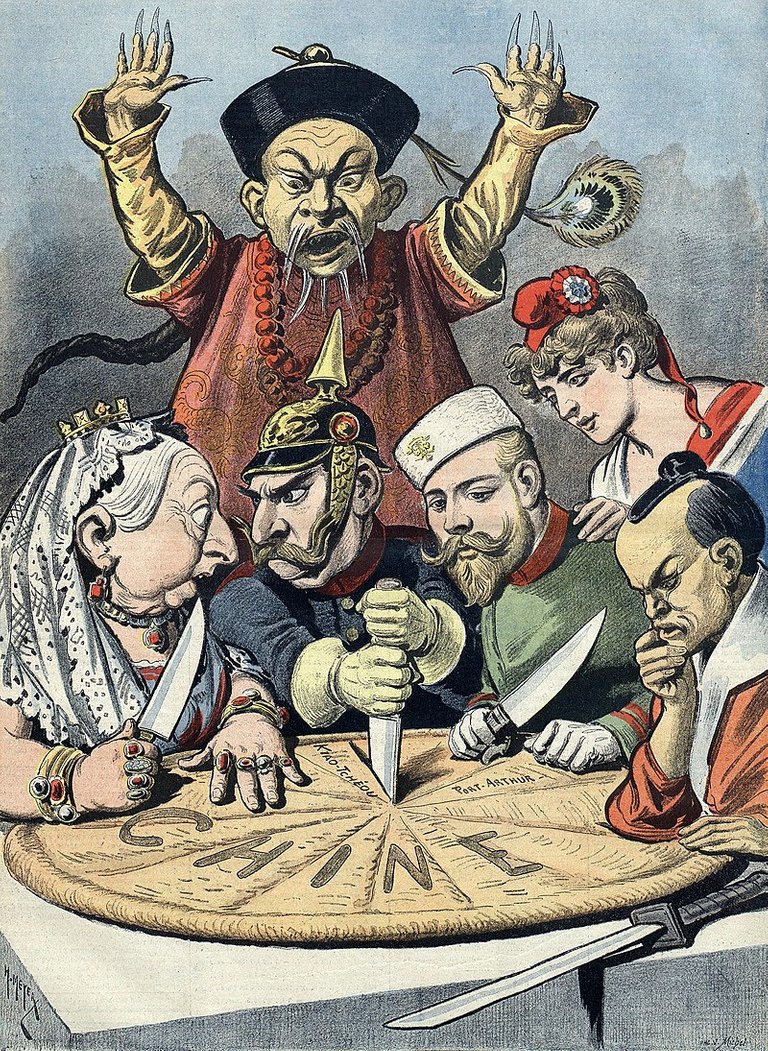 A French political propaganda cartoon depicting China as a pie about to be carved up by Queen Victoria (Britain), Kaiser Wilhelm II (Germany), Tsar Nicholas II (Russia), Marianne (France) and a samurai (Japan), while Boxer leader Dong Fuxiang protests.
A French political propaganda cartoon depicting China as a pie about to be carved up by Queen Victoria (Britain), Kaiser Wilhelm II (Germany), Tsar Nicholas II (Russia), Marianne (France) and a samurai (Japan), while Boxer leader Dong Fuxiang protests.
The Boxer Rebellion, also known as the Boxer Uprising, the Boxer Insurrection, or the Yihetuan Movement, was an anti-foreign, anti-colonial, and anti-Christian uprising in China between 1899 and 1901, towards the end of the Qing dynasty, by the Society of Righteous and Harmonious Fists (Yìhéquán), known as the "Boxers" in English because many of its members had practised Chinese martial arts, which at the time were referred to as "Chinese boxing".
After the Sino-Japanese War of 1895, villagers in North China feared the expansion of foreign spheres of influence and resented the extension of privileges to Christian missionaries, who used them to shield their followers. In 1898 Northern China experienced several natural disasters, including the Yellow River flooding and droughts, which Boxers blamed on foreign and Christian influence. Beginning in 1899, Boxers spread violence across Shandong and the North China Plain, destroying foreign property such as railroads and attacking or murdering Christian missionaries and Chinese Christians. The events came to a head in June 1900 when Boxer fighters, convinced they were invulnerable to foreign weapons, converged on Beijing with the slogan "Support the Qing government and exterminate the foreigners."
Diplomats, missionaries, soldiers and some Chinese Christians took refuge in the diplomatic Legation Quarter. An Eight Nation Alliance of American, Austro-Hungarian, British, French, German, Italian, Japanese and Russian troops moved into China to lift the siege and on June 17 stormed the Dagu Fort, at Tianjin. The Empress Dowager Cixi, who had initially been hesitant, now supported the Boxers and on June 21, issued an Imperial Decree declaring war on the invading powers. Chinese officialdom was split between those supporting the Boxers and those favouring conciliation, led by Prince Qing. The supreme commander of the Chinese forces, the Manchu General Ronglu (Junglu), later claimed he acted to protect the foreigners. Officials in the southern provinces ignored the imperial order to fight against foreigners.
The Eight-Nation Alliance, after initially being turned back by the Imperial Chinese military and Boxer militia, brought 20,000 armed troops to China. They defeated the Imperial Army in Tianjin and arrived in Beijing on August 14, relieving the fifty-five day siege of the Legations. Plunder of the capital and the surrounding countryside ensued, along with summary execution of those suspected of being Boxers in retribution. The Boxer Protocol of September 7, 1901, provided for the execution of government officials who had supported the Boxers, provisions for foreign troops to be stationed in Beijing, and 450 million taels of silver— more than the government's annual tax revenue—to be paid as indemnity over the course of the next 39 years to the eight nations involved. The Qing dynasty's handling of the Boxer Rebellion further weakened their control over China, and led the dynasty to attempt major governmental reforms in the aftermath.
At that time, in the East Asian world, Europe and Japan led by the British Empire were concentrating on conquering China.
The beautiful British Queen, probably seemd be loved by dear @roleerob, was truly loved and respected by the Chinese.
So, The Chinese called the beautiful Queen of Great Britain and her gentleman friends a robber, a murderer, a rapist, a drug dealer, a con artist, an arsonist, and a pirate.🤣
The Japanese began to compare Europeans with Americans.
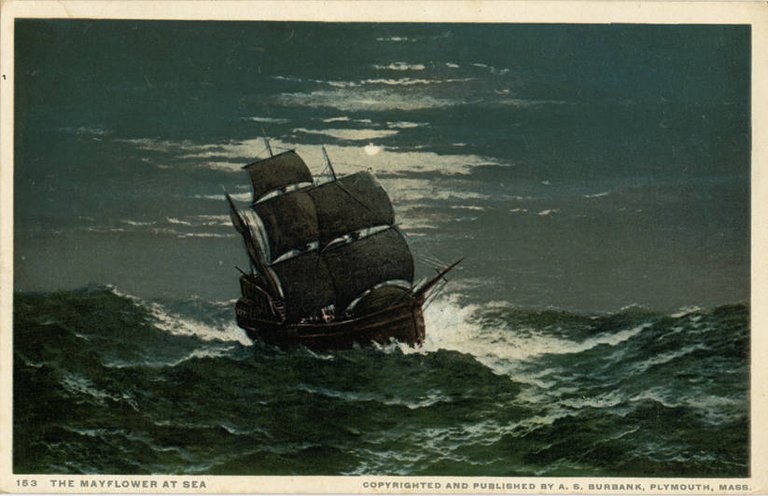 Mayflower at sea
Mayflower at sea
Mayflower was an English ship that transported a group of English families, known today as the Pilgrims, from England to the New World in 1620. After a grueling 10 weeks at sea, Mayflower, with 102 passengers and a crew of about 30, reached America, dropping anchor near the tip of Cape Cod, Massachusetts, on November 21 [O.S. November 11], 1620.
Differing from their contemporaries, the Puritans (who sought to reform and purify the Church of England), the Pilgrims chose to separate themselves from the Church of England because they believed it was beyond redemption due to its Roman Catholic past and the church's resistance to reform, which forced them to pray in private. Starting in 1608, a group of English families left England for the Netherlands, where they could worship freely. By 1620, the community determined to cross the Atlantic for America, which they considered a "new Promised Land", where they would establish Plymouth Colony.[2]: 44
The Pilgrims had originally hoped to reach America by early October using two ships, but delays and complications meant they could use only one, Mayflower. Arriving in November, they had to survive unprepared through a harsh winter. As a result, only half of the original Pilgrims survived the first winter at Plymouth. If not for the help of local indigenous peoples to teach them food gathering and other survival skills, all of the colonists might have perished. The following year, those 53 who survived,[3] celebrated the colony's first fall harvest along with 90 Wampanoag Native American people,[4] an occasion declared in centuries later the first American Thanksgiving.[5] Before disembarking the Mayflower, the Pilgrims wrote and signed the Mayflower Compact, an agreement that established a rudimentary government, in which each member would contribute to the safety and welfare of the planned settlement. As one of the earliest colonial vessels, the ship has become a cultural icon in the history of the United States.[6]

It didn't take long for the Japanese to realize that Americans were different from Europeans.
Most Americans are descendants of fanatic Puritans who rejected European Catholicism and the Anglican Church and went to the New World in search of religious freedom.
Currently, Americans are building a mega empire that rules the entire New World.
Americans are conquering the entire New World based on their Christian beliefs.
With its vast territory and limitless resources, the United States will soon surpass all of Europe, including the British Empire.
Americans are advancing into Japan and East Asia in the name of Christian missions.
The Japanese concluded that Americans were far more pure and fanatical Christians than secular Europeans!
The Japanese were convinced that the Americans would try to conquer Japan after conquering the entire New World.
So, the Japanese were convinced that in order to prepare for a future war with the United States, they should first study Europe, the ancestor of Americans!
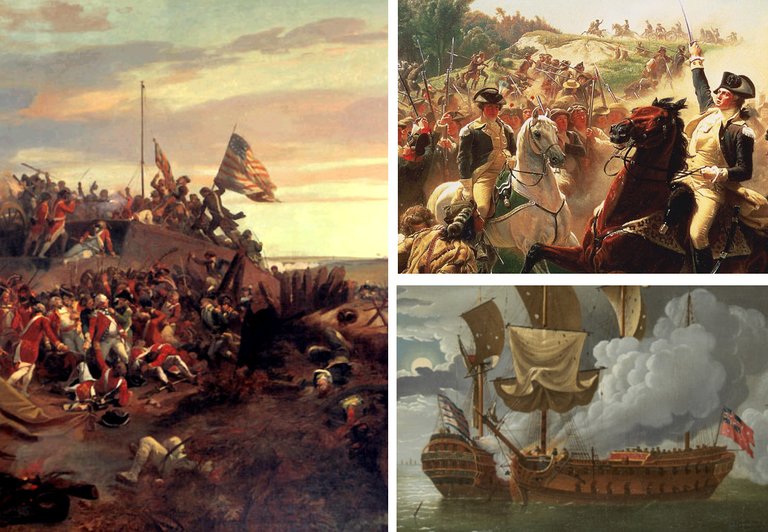 Clockwise from left: Continental infantry at Redoubt 10, Yorktown; Washington rallying the broken center at Monmouth; USS Bonhomme Richard capturing HMS Serapis
Clockwise from left: Continental infantry at Redoubt 10, Yorktown; Washington rallying the broken center at Monmouth; USS Bonhomme Richard capturing HMS Serapis
The American Revolutionary War (April 19, 1775 – September 3, 1783), also known as the Revolutionary War or American War of Independence, secured American independence from Great Britain. Fighting began on April 19, 1775, followed by the Lee Resolution on July 2, 1776, and the Declaration of Independence on July 4, 1776. The American Patriots were supported by the Kingdom of France and, to a lesser extent, the Dutch Republic and the Spanish Empire, in a conflict taking place in North America, the Caribbean, and the Atlantic Ocean.
Established by royal charter in the 17th and 18th centuries, the American colonies were largely autonomous in domestic affairs and commercially prosperous, trading with Britain and its Caribbean colonies, as well as other European powers via their Caribbean entrepôts. After British victory over the French in the Seven Years' War in 1763, tensions between the motherland and her 13 colonies arose over trade, policy in the Northwest Territory, and taxation measures, including the Stamp Act and Townshend Acts. Colonial opposition led to the Boston Massacre in 1770 which largely fostered the idea of independence from Britain. While the earlier taxation measures were repealed, Parliament adopted the Tea Act in 1773, a measure that led to the Boston Tea Party on December 16. In response, Parliament imposed the so-called Intolerable Acts in mid-1774, closing the Boston Harbor, revoking Massachusetts' charter, and placing the colony under control of the British government.
The measures stirred unrest throughout the colonies, 12 of which sent delegates to Philadelphia in early September 1774 to organize a protest as the First Continental Congress. In an appeal to Britain's George III seeking peace, the Congress drafted a Petition to the King but also threatened a boycott of British goods known as the Continental Association if the Intolerable Acts were not withdrawn. Despite attempts to achieve a peaceful solution, fighting began, after the Westminster Massacre in March, with the Battle of Lexington on April 19, 1775, and in June Congress authorized the creation of a Continental Army with George Washington as commander-in-chief. Although the "coercion policy" advocated by the North ministry was opposed by a faction within Parliament, both sides increasingly viewed conflict as inevitable. The Olive Branch Petition sent by Congress to George III in July 1775 was rejected, and in August Parliament declared the colonies in a state of rebellion.
Following the loss of Boston in March 1776, Sir William Howe, the new British commander-in-chief, launched the New York and New Jersey campaign. He captured New York City in November, before Washington won small but significant victories at Trenton and Princeton, which restored Patriot confidence. In summer 1777, Howe succeeded in taking Philadelphia, but in October a separate force under John Burgoyne was forced to surrender at Saratoga. This victory was crucial in convincing powers like France and Spain that an independent United States was a viable entity. The Continental Army then went into winter quarters in Valley Forge, where General von Steuben drilled it into an organized fighting unit.
France provided the US informal economic and military support from the beginning of the rebellion, and after Saratoga the two countries signed a commercial agreement and a Treaty of Alliance in February 1778. In return for a guarantee of independence, Congress joined France in its global war with Britain and agreed to defend the French West Indies. Spain also allied with France against Britain in the Treaty of Aranjuez (1779), though it did not formally ally with the Americans. Nevertheless, access to ports in Spanish Louisiana allowed the Patriots to import arms and supplies, while the Spanish Gulf Coast campaign deprived the Royal Navy of key bases in the south.
This undermined the 1778 strategy devised by Howe's replacement, Sir Henry Clinton, which took the war into the Southern United States. Despite some initial success, by September 1781 Cornwallis was besieged by a Franco-American force in Yorktown. After an attempt to resupply the garrison failed, Cornwallis surrendered in October, and although the British wars with France and Spain continued for another two years, this largely ended fighting in North America. In April 1782, the North ministry was replaced by a new British government which accepted American independence and began negotiating the Treaty of Paris. With the treaty's ratification on September 3, 1783, Britain accepted American independence, and the war officially ended. The Treaties of Versailles resolved separate conflicts with France and Spain.[41]
The Japanese understood the American Revolution to be the first event that created the United States as a completely different republic from Europe!
From the Japanese point of view, European empires were a feudal world dominated by Japanese-like overlords through slavery and serfdom!
The Japanese overlords were convinced that by studying the emperors, popes, kings, and nobles of Europe, they could learn about America's roots.
Perhaps studying the history of Europe's overlords and empires will reveal America's weaknesses!
The Japanese took note of the fact that the French revolutionized to become a republic like the United States.
The Storming of the Bastille, 14 July 1789The French Revolution (French: Révolution française [ʁevɔlysjɔ̃ fʁɑ̃sɛːz]) was a period of radical political and societal change in France that began with the Estates General of 1789 and ended with the formation of the French Consulate in November 1799. Many of its ideas are considered fundamental principles of liberal democracy,[1] while phrases like liberté, égalité, fraternité reappeared in other revolts, such as the 1917 Russian Revolution,[2] and inspired campaigns for the abolition of slavery and universal suffrage.[3] The values and institutions it created dominate French politics to this day.[4]
Its causes are generally agreed to be a combination of social, political and economic factors, which the existing regime proved unable to manage. In May 1789, widespread social distress led to the convocation of the Estates General, which was converted into a National Assembly in June. Continuing unrest culminated in the Storming of the Bastille on 14 July, which led to a series of radical measures by the Assembly, including the abolition of feudalism, the imposition of state control over the Catholic Church in France, and extension of the right to vote.
The next three years were dominated by the struggle for political control, exacerbated by economic depression and civil disorder. Opposition from external powers like Austria, Britain, and Prussia resulted in the outbreak of the French Revolutionary Wars in April 1792. Disillusionment with Louis XVI led to the establishment of the French First Republic on 22 September 1792, followed by his execution in January 1793. In June, an uprising in Paris replaced the Girondins who dominated the National Assembly with the Committee of Public Safety, headed by Maximilien Robespierre.
This sparked the Reign of Terror, an attempt to eradicate alleged "counter-revolutionaries"; by the time it ended in July 1794, over 16,600 had been executed in Paris and the provinces. As well as its external enemies, the Republic faced internal opposition from both Royalists and Jacobins and in order to deal with these threats, the French Directory took power in November 1795. Despite a series of military victories, many won by Napoleon Bonaparte, political divisions and economic stagnation resulted in the Directory being replaced by the Consulate in November 1799. This is generally seen as marking the end of the Revolutionary period.
The Japanese concluded that the French Revolution was the greatest and most important first event in which the American Revolution spread throughout the world!
French civilians started the French Revolution to become a republic like the United States, which turned Europe into a sea of fire for revolutionary wars.
The overlords of Japan were gripped with fear and anxiety that if American revolutionary ideas were to spread to Japan, they would suffer a tragic death like Louis XVI.
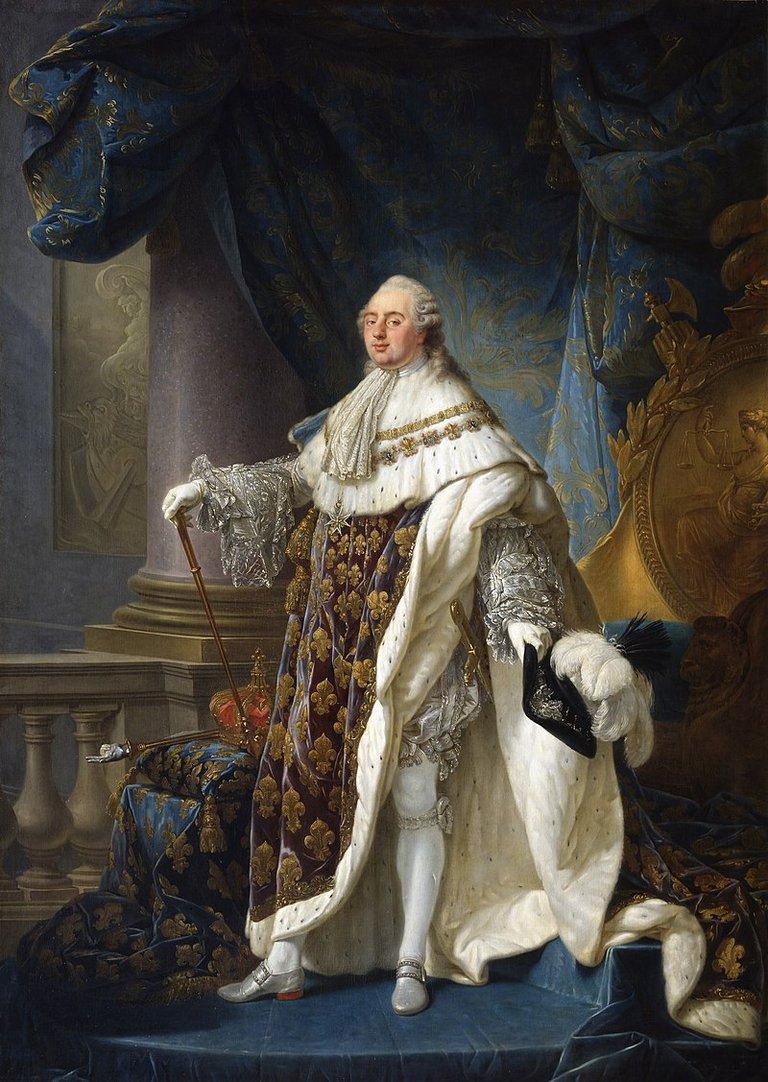 Portrait by Antoine-François Callet, 1789
Portrait by Antoine-François Callet, 1789
Louis XVI (Louis-Auguste; French pronunciation: [lwi sɛːz]; 23 August 1754 – 21 January 1793) was the last King of France before the fall of the monarchy during the French Revolution. He was referred to as Citizen Louis Capet during the four months just before he was executed by guillotine. He was the son of Louis, Dauphin of France, son and heir-apparent of King Louis XV, and Maria Josepha of Saxony. When his father died in 1765, he became the new Dauphin. Upon his grandfather's death on 10 May 1774, he became King of France and Navarre, reigning as such until 4 September 1791, when he received the title of King of the French, continuing to reign as such until the monarchy was abolished on 21 September 1792.
To the Japanese, Louis XVI was perceived as a representative of an incompetent monarch.
However, a man from Corsica was recognized by the Japanese as the greatest overlord!
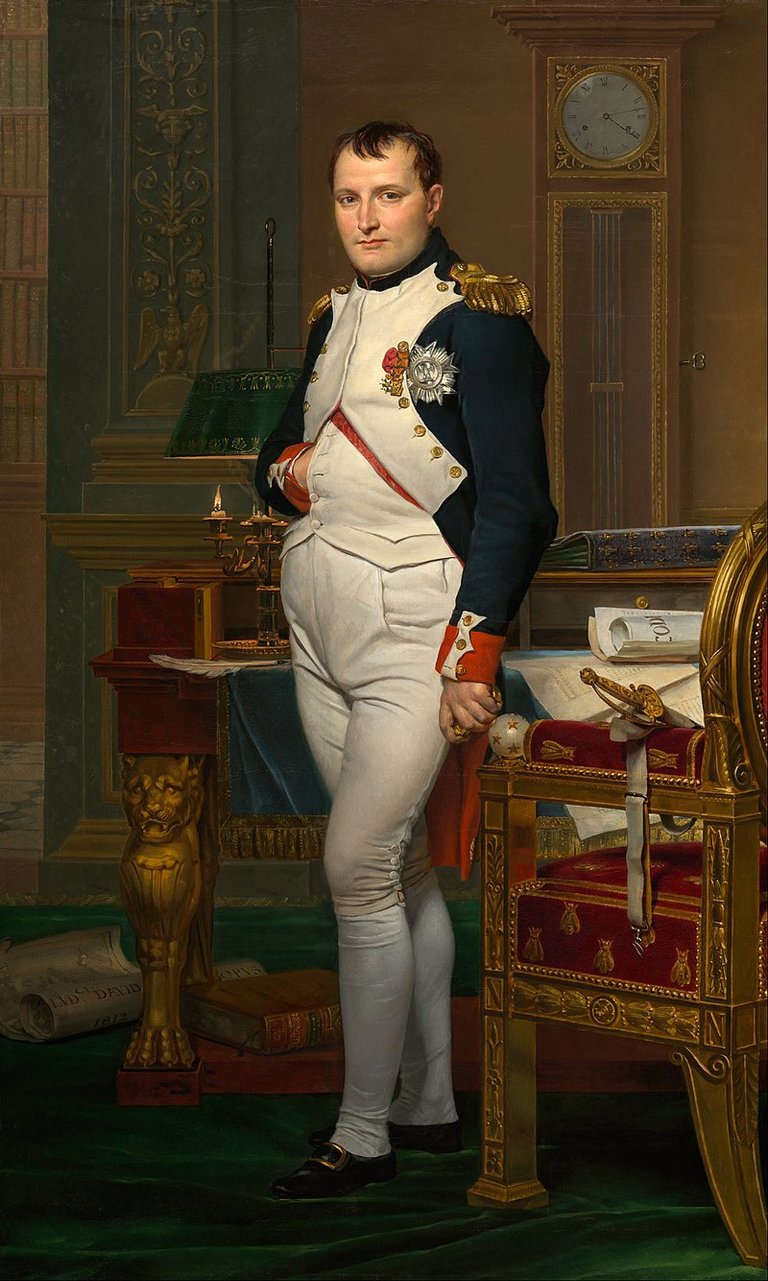 The Emperor Napoleon in His Study at the Tuileries, by Jacques-Louis David, 1812
The Emperor Napoleon in His Study at the Tuileries, by Jacques-Louis David, 1812
Napoleon, also Napoleon Bonaparte[a] (born Napoleone Buonaparte; 15 August 1769 – 5 May 1821), and later known by his regnal name Napoleon I,[b] was a French military and political leader who rose to prominence during the French Revolution and led several successful campaigns during the Revolutionary Wars. He was the de facto leader of the French Republic as First Consul from 1799 to 1804, and as Napoleon I, he was Emperor of the French from 1804 until 1814 and again in 1815. Napoleon's political and cultural legacy has endured to this day, and he stands as one of the most celebrated and controversial leaders in world history.[2][3]
The hero Napoleon, perhaps loved by @valued-customers, is still recognized by the Japanese as the greatest overlord to this day!😆
Napoleon is loved by the overlords of Japan because he used the revolution to become emperor!
I don't know what @roleerob and @valued-customer thought about the relationship and achievements of the French Revolution and Napoleon, but I know a little bit about the Japanese' thought!
Overlords of Japan respect Napoleon for the fact that he first became emperor of the empire after gaining fame and power by fighting for the revolution!
From the Japanese point of view, Napoleon was initially a revolutionary and eventually became an overlord.
So, for the overlords of Japan, Napoleon became a role model that must be imitated.
Americans are probably more aware of the double-minded thoughts and attitudes of the Japanese overlords!
 The US won a trade war against Japan. But China is a whole new ball game
The US won a trade war against Japan. But China is a whole new ball game
My two American seniors probably know the economic war between the United States and Japan in the 1980s better than I do!😉
Now the Chinese will try to prove to the Americans that they are different from the Japanese!
I would like to write more English sentences, but I felt the need to stop at this point because of my poor English skills.
I will write more articles in the future, supplementing the materials and English sentences!
The above statements are all my personal research, so I cannot provide sources!
I look forward to your help and advice!
1. The relationship between Hitler and the East Asian overlords.
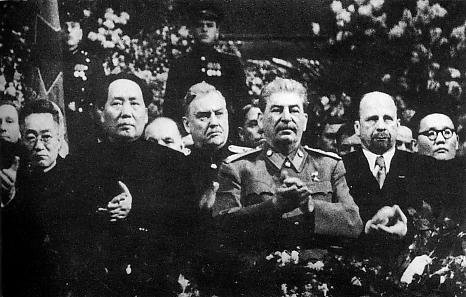
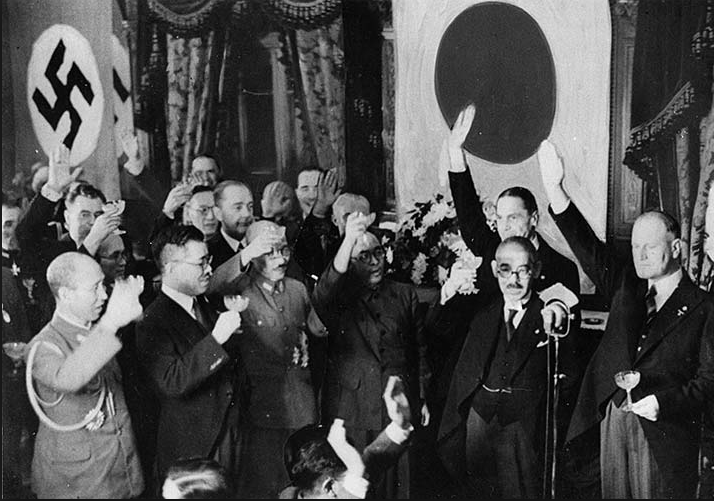

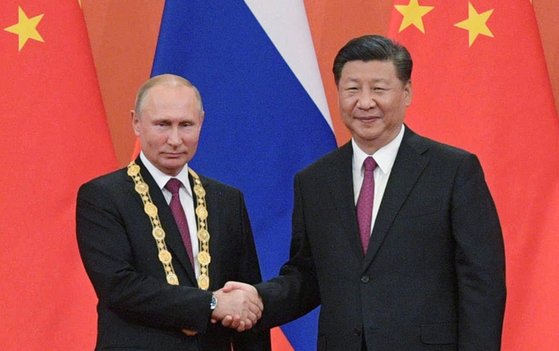
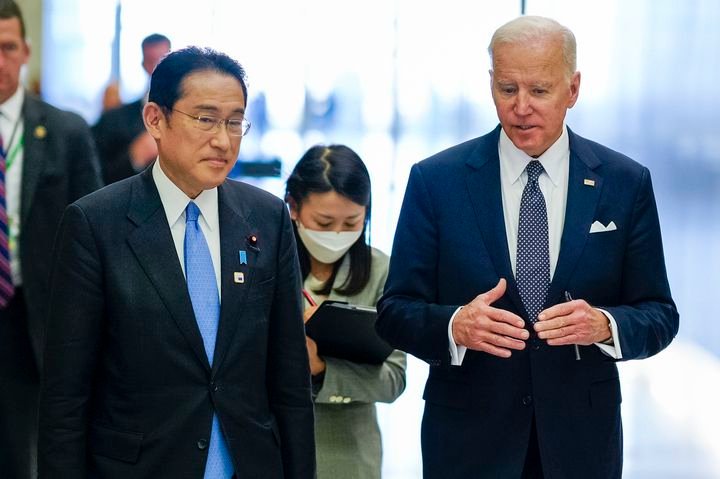
PS: Please forgive me for my rude use of Your Majesty's photos without permission!🙏
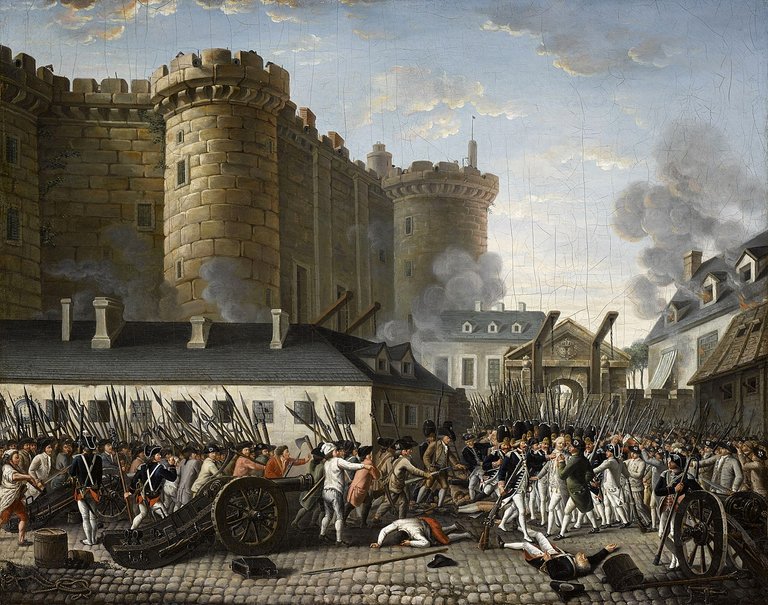
Truly an epic post, replete with exemplary erudition and exposition of events and understanding underscoring your points. I do completely agree that only recently has the advent of decentralization enabled communications, transport, and production of modern goods and services to transcend the geopolitical realities that underlay war and conquest, but that novel advent has utterly transformed those facts.
People involved in events of historical import only a few decades ago now face a completely transformed world. Cartoons like Dick Tracy were able to portray wristwatch videophones as completely fictional, but today such communications - with the addition of vast reams of data - are passe and facile. The very essence of society has radically changed from a geas on government to facilitate and support the felicity of their populations to a tyrannical imposition of despotism across the West, oppressive censorship, forced medical experimentation, fiscal deprivation and austerity, and public shaming as evident in Mao's ascent to power by the promotion of the Red Brigades. These devolutions in civil society have been imposed as the banksters have ever more deeply penetrated national governments, corrupting civic institutions, and replaced elections with appointment from their indoctrinated minions, trained to serve their financial masters and betray their hapless subjects.
Even as Communism has succeeded in conquering the West, the advance of technology has conversely decentralized means of production and enabled dramatic increases in productivity not to economies of scale, but to bespoke local manufacturing, which threatens to relegate overlords themselves to the dustbin of history by eliminating parasitic losses which are the sole source of wealth of overlords. It would be idiocy to fail to note that incipient evolution of technology by them dependent on parasitism for their power, and overlords clearly are not idiots. Long before we plebs have grasped our potential to create our wealth in the new paradigm, the WEF was created to prevent our escape from their power, and the imposition of the present Communist despotism was commenced on a global scale. The New World Order is now in control of all national governments of consequence, and globalism has allied the UN, the WHO, and BIS in an unholy triple entente banksters intend to wield to subjugate all humanity to their perpetual reign.
That global order pits nation against nation not to conquer clay for their side, not to gain resources from competitors, because that global order is global. It is all sides, China, Ukraine, Russia, and the West are all incorporated into the NWO, all are on the same side from the perspective of the banksters that have penetrated and infiltrated every national government and corrupted them until they are but arms of WEF policy.
Geopolitics has become a diversion from the real conquest of society as a whole, pitting the peoples of one region against another while enslaving them all. The overlords of the WEF have conquered the whole world, and do not need to wage war of conquest. The conquest has already been completed, by insidious corruption and betrayal of free people who are being subjected to the despotic surveillance and censorship of those totalitarian dictatorships so recently held up as the enemies of Western democratic republics, like the USSR, CCP, and Islamic theocracies.
I do not disagree that up until the 20th Century wars were necessarily geopolitical contests between nations vying for resources and clay. I simply note that the WEF today owns all resources, holds title to all clay. They seek only to impose equally on all peoples the tyranny totalitarians have desposed, and to use modern AI and algorithms to transform tyranny into technocratism, not less, but more totalitarian than ever before in history.
With that conquest of Communism of the world has arrived decentralized means of production of every possible good and service, enabling individual households and small communities to themselves create their necessities, and all the blessings of civilization without the massive capitalization and industrial collectivism that has so long enriched overlords.
That is the true war being waged today: totalitarian tyrants intent on enslaving utterly all humanity against free and sovereign people themselves creating every blessing of civilization and the felicity of the prophesied paradise of ancient seers.
Thanks!
Dear @valued-customer!
Your wonderful and great sentences seem unfamiliar and difficult for American elementary school students!😅
I will reply after translating your sentences!
Thank you!
The essence of my comment is found in the last paragraph.
saved for later reading but already from first glance looks like quite a good upcoming read! ;)
hope it is not too late for a
@tipu curate
:)
Dear @woelfchen!
I remember you are probably a German woman!
Thank you for praising my awkward English sentences!😄
I've read your articles before, but I don't know any German, so I didn't write you a comment.
What do you mean?
Please understand that I have an American elementary school level of English!😄
hahaha, no, I am not a woman ^^
tipu is a tipping bot, but I think I found your article too late, too close to payout, so the tipping bot doesnt work
Ahha, I am sorry! Because I'm not good at English, I misunderstood you as someone else!😅
I didn't know tipu is a tipping bot! I still don't know the concept and usage of Hive blockchain!
Thank you for advice!